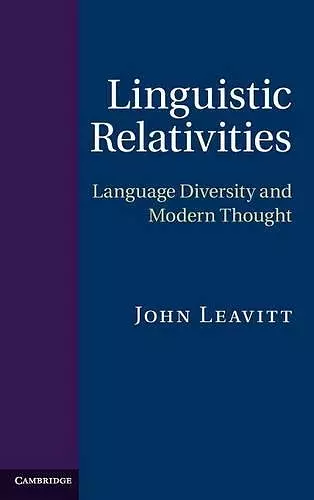Linguistic Relativities
Language Diversity and Modern Thought
Format:Hardback
Publisher:Cambridge University Press
Published:23rd Dec '10
Currently unavailable, and unfortunately no date known when it will be back
This hardback is available in another edition too:
- Paperback£37.99(9781107558632)

Does your language influence your thought and world view? This book is a history of responses to this question since the 1500s.
Does the language you speak influence your thought and world view? This book offers a history of responses to this question over the last half millennium: usually a simple yes (Renaissance, Romantics, Neoromantics) or no (Enlightenment, most cognitive science), but sometimes more nuanced explorations (Boasian linguistics, recent work in cognition).There are more than six thousand human languages, each one unique. For the last five hundred years, people have argued about how important language differences are. This book traces that history and shows how language differences have generally been treated either as of no importance or as all-important, depending on broader approaches taken to human life and knowledge. It was only in the twentieth century, in the work of Franz Boas and his students, that an attempt was made to engage seriously with the reality of language specificities. Since the 1950s, this work has been largely presented as yet another claim that language differences are all-important by cognitive scientists and philosophers who believe that such differences are of no importance. This book seeks to correct this misrepresentation and point to the new directions taken by the Boasians, directions now being recovered in the most recent work in psychology and linguistics.
'… a must-read for anyone concerned with the language-thought interface.' Asifa Majid, Max Planck Institute for Psycholinguistics
'This volume has an intriguing, not wholly transparent title. It is a stimulating account of three distinct topics, the first belonging to linguistic theory (what is linguistic relativity?), the second to the history of linguistics (how is/was language diversity treated in linguistic thought?), and the third to the history of philosophy (in what way does/did a philosophical perspective contribute to clarifying these questions?).' Giulio Lepschy, Modern Language Review
'I wholeheartedly recommend this book to anyone interested in the relation between language and thought, linguistic diversity and to everyone who is seriously concerned with the development of central issues in the field of linguistics.' Katerina Stathi, Languages in Contrast
ISBN: 9780521767828
Dimensions: 229mm x 150mm x 20mm
Weight: 510g
256 pages